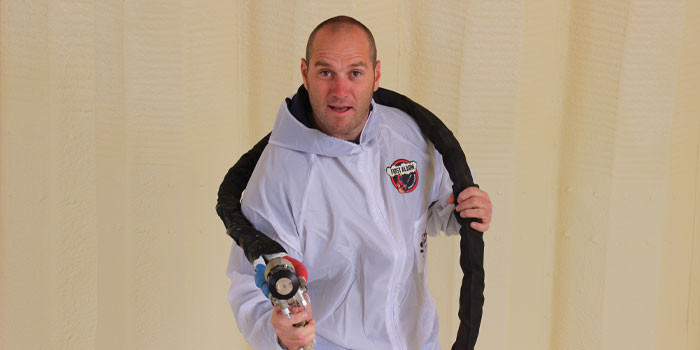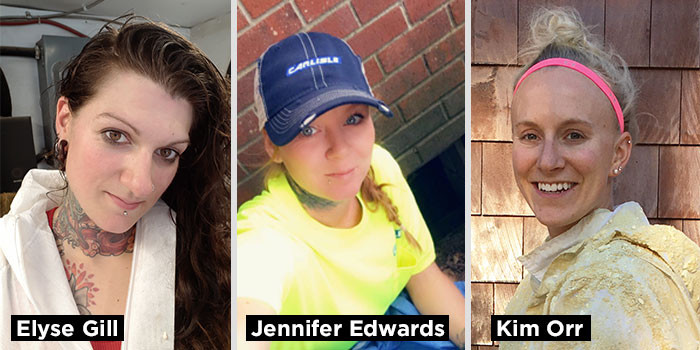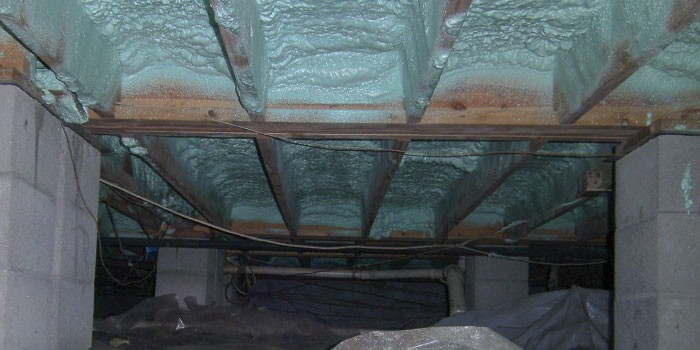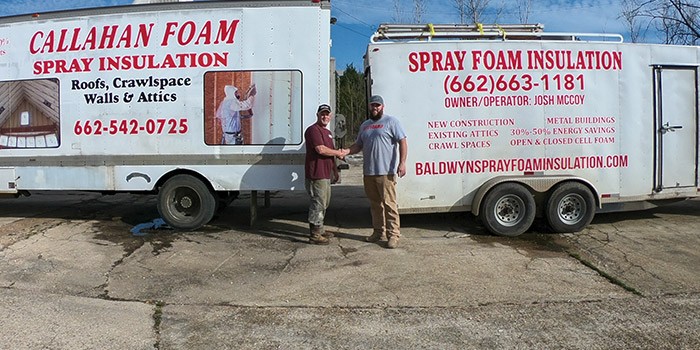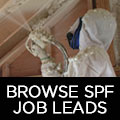The Contractor as Spray Foam Representative


SPRAY FOAM MAGAZINE – Winter Issue 2019 – Like any fast growing industry, the importance of certain aspects may not be fully realized initially, only to later be re-assessed. Such is the case with the spray polyurethane foam industry. Manufacturers are weighing in on the role of the contractor and how it is essential for their company to flourish and advance production in the industry as a whole.
The advantage of using spray foam insulation could easily win any technical argument through the evidence of product performance. The disadvantage to the contractor, however, is loss of business when the consumer chooses a cheaper, less effective solution. How does the industry bridge this information gap and who do they lean on to get the truth out to the potential consumers on how spray foam is the best choice for insulation?
Many consumers have become cynical of traditional marketing methods and they are turning to social media, consumer stories, and contractor reviews to influence their buying decisions. While social media has its place and is also a great way to create an industry community, is it really telling the complete story of the manufacturer’s products and their advantages? How does the manufacturer provide accurate details to the consumer without delivering a sales pitch? The answer is with the people who ultimately trust and use the product—the contractors.
Good relationships are grown by supplying a quality product on time at a reasonable price. Murphy Mahaffey from Polyurethane Machinery Corporation (PMC) emphasizes, “Contractors rely on equipment for their livelihood and product development is contractor-driven. We reach out to our distributors and contractors for their input in what is needed for the industry. This can be in the form of simple product improvements or added features.
Challenges do happen in the field; it is the nature of a dynamic work environment employing a fast-reacting chemical system. When they arise, what is done to resolve the issue, and how quickly it is acted on makes the difference. Everyone in the business needs to understand that if the contractor is not pulling the trigger, then business is at a standstill.”
The Consumer
For all those who have embraced spray foam, there are still many who have not. How does the manufacturer help change this? When a business has poured efforts into technical solutions, they also need to place just as much energy into the contractor and therefore the potential consumer.
Alex Drescher from Carlisle Spray Foam Insulation helps explain, “Building a great relationship with our contractors is accomplished through many ways, including technical training, education, and providing marketing support to grow their business. Also, through our products, we ensure customer satisfaction with consistent performance, which is proven through product testing. We recognize the influence contractors provide in the spray foam insulation market, and we encourage open communication channels and positive relationships.”
Educating and Embracing the Contractor
The contractor as a spray foam representative is essential to the marketing side of the manufacturer’s business. Imagine that the contractor was directly working for the manufacturer; they would not be ignored or left to their own devices. Instead, they would be educated in the company culture, products, and advancements.
Manufacturers who view the contractors as an extension of their workforce will have an advantage by ensuring product benefits are explained, listening to feedback, and dealing with any issues or questions. Sometimes the most innovative ideas are generated from the direct source, as in the person who uses their products every day. They are in fact the voice and sales force behind the product. Having a productive manufacturer-contractor relationship is also more likely to result in brand loyalty.

Among SPF industry professionals and representatives, it is common knowledge that spray foam is proven to be a superior insulation choice. By manufacturers and contractors working together, this can be more easily conveyed to a skeptical consumer.
The common consensus among manufacturers is that these relationships have greatly improved in recent times. Manufacturers are now more than ever focusing on technical training for contractors, in addition to aiding of education of consumers on the benefits of spray foam insulation.
Dusty McNab from Akurate Dynamics emphasizes, “When foams are not certified or proper training is not given to contractors, then there is no benefit to the industry. I believe that a large portion of the manufacturers and consumers want the best for this industry. With only 18 percent of the residential market using spray foam every day, there is so much more opportunity to educate the consumer, growing the overall marketing share, and transforming the spray foam industry.”
As manufacturers and consumers engage with each other via the contractor, the advantages of spray foam insulation are being co-promoted to grow the market. Consumers are learning the enhanced benefits of spray foam insulation, which we all know increases energy efficiency, air quality, and most importantly, overall comfort.
Educating the contractor is imperative for the correct message to be relayed to the potential consumer. What does the consumer want to know about the product?
The product is being sprayed within the home or business, so they first of all want to know how safe the product is. Secondly, how much will it cost, and lastly, “Is it a green product?”
Going Green – Spray foam insulation cuts down on emissions and therefore energy bills. It is an environmentally conscious product because it reduces the amount of heated or cooled air losses.
Global analytics and advice firm Gallup have analyzed and reported on an age gap with the issue of climate change. The attitudes, views, and risk perceptions of 70 percent of adults aged 18-34 reflect they are worried about global warming compared to only 56 percent of those aged 55 or older. This is a statistic which cannot be ignored because the homebuyers of the future will take into account “green features” when purchasing a home.
Whether in South Florida and running an air conditioning unit all year round or in Alaska where the heating is on for a large portion of the year, the building envelope has to be taken seriously with imperfections and leaks amounting to wasted energy. Spray foam has the superior quality of being able to get into the smallest cracks and crevices, while lasting three times as long as alternative insulation methods, which in turn reduces landfill waste. All of these qualities are essential information for the contractor to relay to the potential consumer.
Mengya Li, Global Business Manager, Spray Foam, at Honeywell states, “Consumers want transparency and hold manufacturers to increasingly high standards. We recognize that they want to make informed choices for products that perform well and are better for the environment. To meet that need, Honeywell developed Solstice® blowing agents for closed-cell spray foam based on advanced hydrofluoro-olefin technology. This gives consumers an exciting solution that improves the energy efficiency of their homes and helps to reduce global warming.”
Financial Advantage for the Consumer – The knock-on effect for saving on emissions is lowering the utility bills. Contractors often hear potential customers stating that the initial cost of insulation is too expensive. They need to explain how the long-term savings and benefits outweigh the initial cost. The manufacturer should constantly ask themselves, “How can we further convey this message to the contractors and therefore the consumer?”
Health and Comfort – Spray foam insulation is also the best choice to seal your home when it comes to protecting it from pests, moisture,and the outside elements. Its high R-value per inch and its capacity to act as an unremitting air barrier are big benefits if properly installed. It is essential to convey to the consumer the contractor’s certification in spraying foam. It gives them the piece of mind that the insulation in their home or business is applied by qualified professionals.
In locations that are particularly damp or experience large amounts of rainfall, buildings and homes may have experienced leaking roofs, damp walls, rising water through a basement or leaking window frames. These are all potentially hazardous situations if left untreated because they can result in serious damage to a building or even worse, serious health implications. Moisture in a building can cause a buildup of mold and lead to respiratory infections, allergies, and asthma.
The consumer should be aware of this potential threat to prevent a hazardous situation in the first place. By spraying spray foam insulation with a certified applicator, the home is sealed from the outside elements and therefore could help to avoid a catastrophe.
The Contractors and Consumer Connection
Tim Lockhart from Flame Control Coatings highlights the fact the consumer is now being educated by the help of the contractor about what exactly is being specified for their project. “From an intumescent coatings standpoint, it has been about helping people understand what meets the code. Historically there has been a lot of confusion about thermal and ignition barriers and when they are needed. I feel like we have really started to bridge the information gap.”
The spray foam world isn’t just an industry, it’s a community with manufacturers and contractors all taking pride in what they do. By taking responsibility and working together, the message of the benefits of spray foam are clear to the consumer. Social media can be a great way for contractors to share photos and short videos to one another or the manufacturer to show an image of a product. How does that help the contractor and educate the consumer? Communication today is just a click away with cell phones with built in cameras and google maps, it helps to see a visual while speaking to the contractor making it easier to solve any situation as it arises.
Lockhart stresses, “The applicators are the tip of the spear, they’re the ones working with the customers and they’re the ones answering callbacks if something goes wrong. My goal is simple—to make it easy on the applicator. Give them a product which is easy to spray and backed by a strong testing program so that when they pull the trigger, they don’t have to worry about anything else.”
Steve Henderson of DCI Products further explains the relationship between the distributor and the consumer. “The DCI consumer in our business environment is the contractor, but our DCI material source is the distributor. So our contractor relationships have improved greatly due to our persistence and dedication to them and working jointly between the distributor and contractor equally. We see them both as partners, since we all have certain responsibilities to get the job done right and on time.”
A joint effort across the industry to educate and communicate with contractors and therefore the consumers has led to a superior relationship between all parties. Elevated levels of commitment and conviction and the readiness to share risks, respond to clients needs, improve efficiency, and understand the individual roles of all parties will lead to successful industry expansion for years to come.
Disqus website name not provided.



